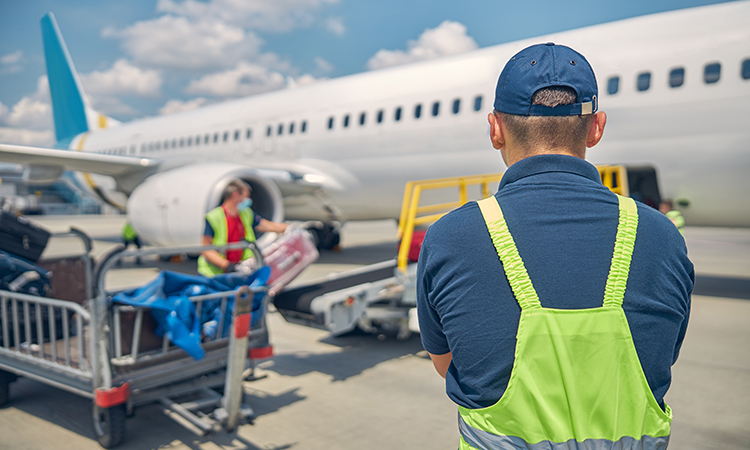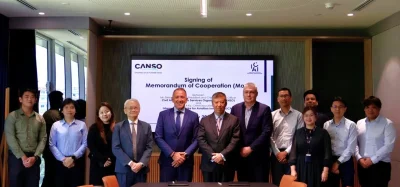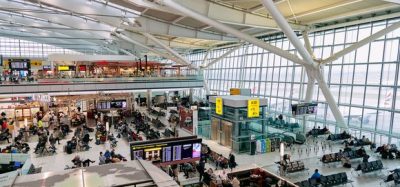Aviation can only recover if it realises its most vital resource – its workforce
- Like
- Digg
- Del
- Tumblr
- VKontakte
- Buffer
- Love This
- Odnoklassniki
- Meneame
- Blogger
- Amazon
- Yahoo Mail
- Gmail
- AOL
- Newsvine
- HackerNews
- Evernote
- MySpace
- Mail.ru
- Viadeo
- Line
- Comments
- Yummly
- SMS
- Viber
- Telegram
- Subscribe
- Skype
- Facebook Messenger
- Kakao
- LiveJournal
- Yammer
- Edgar
- Fintel
- Mix
- Instapaper
- Copy Link
Posted: 23 June 2021 | Erin van der Maas | No comments yet
For International Airport Review, Erin van der Maas, Airport Organising Programme Lead at the International Transport Workers’ Federation (ITF), highlights how the inconsistencies between different worker groups, industry stakeholders, state relief, airlines and airports in differing countries during the pandemic has seen the majority of the workforce ignored – an impact which will be severely felt as the industry strives to recover from COVID-19.


The COVID-19 pandemic has hit the aviation industry hard. For an industry that is vulnerable to periodic shocks and crises (financial crash, SARS, 9/11), the COVID-19 crisis is unprecedented in scale, depth and scope – bringing with it a new set of challenges.
The road to an optimal recovery of the industry requires all stakeholders to be actively engaged and coordinated”
At all levels, from the individual worker/passenger up to the International Civil Aviation Organization (ICAO), the road to an optimal recovery of the industry requires all stakeholders to be actively engaged and coordinated. The immediate concerns around health and safety and jobs provide the basis to plot a more sustainable future and to ensure that public interventions and resources are focused on producing public goods and not simply a prop for shareholder value.
It hardly needs spelling out here just how profound the impacts have been, but the industry in 2020 experienced an overall reduction of 50 per cent of seats offered by airlines; an overall reduction of 2,699 million passengers (a 60 per cent decline) and approximately $371 billion loss of gross passenger operating revenues of airlines compared to 20191.
The COVID-19 pandemic has exaggerated, not created, many of the issues that airport workers are facing today”
The COVID-19 pandemic has exaggerated, not created, many of the issues that airport workers are facing today, such as the fragmentation of the industry, the subcontracting and outsourcing of labour and the associated increase in precarious work. As a result of this crisis, many workers have lost their livelihoods with no recompense for being laid-off, regardless of how long they have served the airport, airline or industry.
Whilst the focus of much global industry attention has been on airline carriers, the wider industry has largely been ignored, and it is too early to assess how many independent service providers will be able to restart when travel becomes more normalised.
The crisis also provides a space to reimagine aviation and to address the multitude of issues brought on by decades of excessive liberalisation and deregulation.
The International Transport Workers’ Federation (ITF) has highlighted that a global and comprehensive ‘new deal’ for aviation is required2.
The building blocks for relief, recovery and reform lie in engaging and harnessing the strengths of all stakeholders in the industry, at all levels:
- At the global level, to develop commonly recognised standards and processes for safe passenger travel and safe work in the new environment. ICAO’s COVID-19 Aviation Recovery Task Force (CART), Airports Council International’s (ACI) Airport Health Accreditation (AHA) programme and tools such as the International Air Transport Association’s (IATA) IATA Travel Pass are all indicative of an emerging consensus for a joined-up approach around global initiatives
- At the national level, to ensure that state interventions are strategic and focused on the industry as a whole
- At the airport level, to ensure that all service providers and workers are engaged in creating, monitoring and enforcing new rules and protocols for a healthy airport, which is essential for recovery
- At the enterprise level, to work through the inevitable restructuring via social dialogue and collective bargaining.
This article, whilst acknowledging the importance of global policy and regulation, will focus in on the national and sub-national dimensions to highlight the limitations of responses to date.
State relief and interventions
State financial relief for the industry to date is patchy, has been restricted to a small number of countries and, in many cases, has been targeted at the key airline carriers. States have varied widely in their interventions, with Singapore and the U.S. providing the most comprehensive and bespoke relief for their aviation industry and workers. Union lobbying of decision-makers ensured that the U.S. Coronavirus Aid, Relief, and Economic Security (CARES) Act relief package was extended beyond airline carriers to the independent service providers in ground handling and airline catering.
Unions in many other countries feel that their governments have not risen to this challenge sufficiently and have not developed a national plan for aviation relief; in Australia, Canada and the UK, there is a palpable sense of disappointment from aviation unions over the lack of government intervention during this crisis for what is a hugely important sector and one which will drive growth elsewhere in the economy when recovery comes.
Whilst state interventions are both necessary and welcome, many state relief packages to date have not recognised, let alone addressed, the profound shock and crisis that is facing the aviation industry. Relief packages must also include a focus on worker protections to avoid the industry haemorrhaging more jobs before recovery begins. Labour supply will be a key challenge for the industry as it recovers.
ITF is calling for tri-partite national aviation recovery bodies to determine the level and scope of relief for the industry in each country”
It is in this context that ITF is calling for tri-partite national aviation recovery bodies to determine the level and scope of relief for the industry in each country.
National aviation recovery bodies comprised of labour unions and employers from across the whole industry – airlines; airline catering; Maintenance, Repair and Overhaul (MRO); ground handling; airport operators; air traffic control (ATC) – plus government agencies to enable an effective, longer-term response to the crises that shares the burdens and costs of this more evenly so as to promote recovery, jobs and a sustainable industry in the longer term.
Employer responses
Airline and airport responses to the crisis have also varied greatly. It is beyond the scope of this article to go into any depth here on the thousands of responses coming in day-by-day as this crisis unfolds.
Many employers (independent service providers) are simply below the radar and, in many cases, will cease operating during this crisis, with hundreds and thousands of workers – often in the most precarious employment conditions – receiving little or no compensation for losing their livelihoods. Workers employed directly by an airport or legacy airline have more secure contracts of employment, but finding pockets of decent practice isn’t easy.
In Thailand, the lack of a coordinated response is demonstrable. The Thai government has tried to force through the privatisation of the national carrier. This, in turn, triggered the dissolution of the TG Union (union busting – as it was registered as a state enterprise union) and so left the whole workforce without union representation precisely at the time when workers needed their union most. It may well be that the Thai government reverses its decision to privatise Thai Airways before this pandemic is over.
The Airports of Thailand Company, another state enterprise, also forced through its plan to subcontract cleaning and security functions3. Workers were coerced to sign new contracts with a new company, losing pay and working in inferior conditions. This led to some major violations of workers’ rights and resulted in the workers organising themselves into a new union and bringing these violations to public attention. The moves at Bangkok Suvarnabhumi International Airport (BKK), operated by the Airports of Thailand Public Company Ltd (AOT), suggest a deliberate plan to cut costs, avoid redundancy payments and circumvent recognition of years of service while continuing to retain workers with years of experience. The parent company and the government minister have promised to intervene to remedy the operational shortcomings, and the union is preparing for its first round of collective bargaining.
The two flagship companies in the UK, London Heathrow Airport (LHR) and British Airways (BA), both took unilateral employer action and sought to ‘fire’ and then ‘re-hire’ the same workers on inferior contracts, bypassing normal industrial relations practice. In Australia, Qantas also used the pandemic to operationalise plans to subcontract out its ground handling operations.
Effectively, these companies decided to throw their workers under the proverbial bus and/or hold the proverbial gun to their head to accept inferior terms and conditions. This forces unions to respond, threatens industrial peace, sours industrial relations and alienates workers4.
At best, these are short-term, knee jerk reactions to the crisis; at worst, they are opportunistic attempts to capitalise on the crisis. All of these companies in the UK and Australia were receiving public money from government ‘job retention’ schemes to support furlough costs and workers’ wages.
The state and state agencies must take a more interventionist role to develop a coherent plan for crisis management, to share the costs across the industry and to plan support until recovery”
The state and state agencies must take a more interventionist role to develop a coherent plan for crisis management, to share the costs across the industry and to plan support until recovery. Public money should not be going to companies without conditions attached to produce public goods.
The alternative is to allow aviation to freefall. The aggregate cost of these sub-optimal decisions multiplied across a fragmented industry will preclude an effective recovery and leave the industry even less resilient than it is now.
Good practice alternatives
In all the bad news, there are pockets of good practice that demonstrate how a more interventionist state or airport authority can shape outcomes for the better.
Again, it is beyond the scope of this article to highlight all such cases. I want to focus on two examples where the state either convened the space for parties to negotiate or where a ‘quasi-state’ agency (airport authority) has taken a much more interventionist role to develop an inclusive airport-wide approach. Both examples, in terms of outcomes and process, stand in stark contrast to the examples highlighted above and both contain the key elements required to get the industry through its deepest crisis.
In the Netherlands, the Dutch government agreed to support the national carrier KLM Royal Dutch Airlines (KLM) with state relief, but required an agreement between KLM management and unions on:
- The workers’ contribution to the required cutbacks in the KLM company
- A social plan for workers to mitigate the worst impacts of lay-offs.
So, under the ‘shadow of the state’, negotiations resulted in an agreement. An agreement and a social plan that meant:
- KLM employees shared the costs of the cutbacks, with the very least paid workers in the company exempt from pay cuts
- The company committed to protect jobs and help the transition of workers in this crisis by:
- Finding new jobs in the company for workers who are laid-off
- Providing training for those leaving the industry to help to find new work
- Enhanced parachute payments for laid-off workers
- A right of return for workers on their previous salary and benefits if jobs open up in the next two years in KLM.
At Toronto Pearson International Airport (YYZ) in Canada, the Greater Toronto Airport Authority (GTAA) has been developing an inclusive approach to airport operations. In collaboration with the Toronto Airport Workers Council (TAWC – a coalition of union representatives from across the airport), this new interventionist role for the airport authority seeks to strategically address the core issues for Toronto Pearson, as it hopes to grow into a much larger regional hub for aviation. Critically, this new approach meant that the airport could respond quickly and more effectively to this crisis5.
The ‘community’ approach to airport operations, one that views all airport workers (regardless of who they work directly for) as belonging to the airport community, allowed Toronto Pearson to develop two worker-centric initiatives during this pandemic with a focus on the two key issues of health and safety and job retention.
The GTAA’s ‘Healthy Airport’ initiative and ‘Pearson Works’ have enabled quick, coherent and coordinated responses to the pandemic. With new protocols and practices agreed on health and safety, airlines, independent service providers and union representatives are all brought together in a regular Health & Safety forum to discuss and develop responses. The ‘Pearson Works’ seeks to relocate workers who have been laid off into other jobs around the airport and/or help those workers transit into jobs outside of the sector.
State interventions should be focused now on helping the industry to recover and to help build more resilience going forward. The future of the aviation industry will be determined and shaped by our collective response to this crisis”
It is clear from these two examples that tough decisions can be implemented in ways that are more strategic, forward looking, inclusive and produce better outcomes for both the industry and for workers.
State interventions should be focused now on helping the industry to recover and to help build more resilience going forward. The future of the aviation industry will be determined and shaped by our collective response to this crisis. The state and ‘quasi-state’ entities (like airport authorities) have a key role to play in convening collective spaces to bargain and negotiate a coherent path out of this crisis where costs and benefits are shared across the industry. State intervention can be more than short-term relief and/or public ownership, it can provide the required leadership and space to provide collectively agreed solutions in a highly fragmented industry.
References
- https://www.icao.int/sustainability/Documents/COVID-19/ICAO_Coronavirus_Econ_Impact.pdf?utm_source=International+Civil+Aviation+Organization&utm_campaign=ee583a6789-EMAIL_CAMPAIGN_2021_01_13_09_13&utm_medium=email&utm_term=0_bf5ba6bf53-ee583a6789-343411065&mc_cid=ee583a6789&mc_eid=b538e96674
- https://www.itfglobal.org/en/news/only-new-deal-can-save-aviation
- https://www.itfglobal.org/en/news/bangkok-airport-workers-protest-attack-rights
- The deal agreed by collective bargaining by the Manchester Airport Group (MAG) and Unite the Union in the UK demonstrates a different approach. The deal protected jobs and pay in the short-term with no compulsory lay-offs, whilst the UK government’s job retention scheme is supporting workers directly.
- https://www.pressreader.com/canada/national-post-latest-edition/20210428/281792811880349?fbclid=IwAR1easi3PW9ye0dd311J3bx4es_WEKaqhZtdceULJ1gCS5hHQ4jIbw9-bdA
Erin van der Maas is the Airport Organising Programme lead at the International Transport Workers’ Federation (ITF), a global trade union federation that has 700 affiliated trade unions from 150 countries representing some 20 million workers. Before joining ITF, he was active in trade union and labour market research, both in an academic context and for trade unions in the UK.
Related topics
Airport crisis management, Airside operations, COVID-19, Economy, Regulation and Legislation, Terminal operations, Workforce
Related airports
Bangkok Suvarnabhumi International Airport (BKK), London Heathrow Airport (LHR), Toronto Pearson International Airport (YYZ)
Related airlines
British Airways (BA), KLM Royal Dutch Airlines (KLM), Qantas, Thai Airways
Related organisations
Airports Council International (ACI World), Airports of Thailand Public Company Limited (AOT), Greater Toronto Airports Authority (GTAA), International Air Transport Association (IATA), International Civil Aviation Organization (ICAO), International Transport Workers’ Federation (ITF)


















